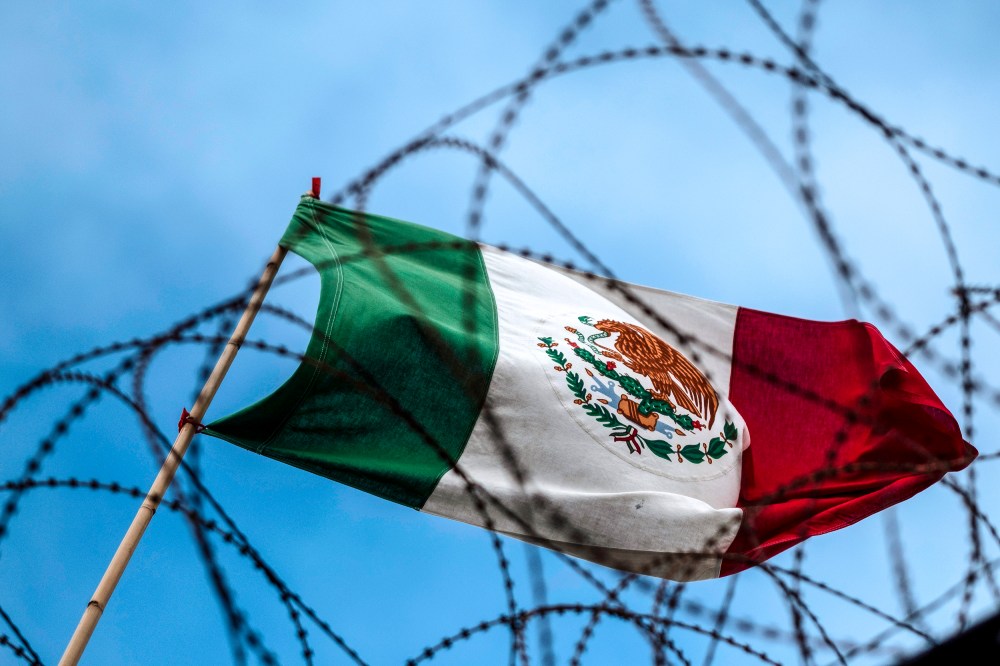As the war in Ukraine rages on, former President Donald Trump and the MAGA right have presented their opposition to continued aid to Ukraine as a position grounded in antiwar principles. Trump’s inner circle is reportedly going so far as to push the narrative that Trump is the “peace president” in the 2024 White House race. Yet at the same time, right-wing nationalists are displaying an increasing appetite for launching a new war altogether — in Mexico.
It’s a bizarre, disconcerting development, and a reminder that right-wing nationalists’ aversion to backing Ukraine isn’t based on a commitment to minimizing the harm caused by war. It is in reality a reluctance to use force that doesn’t more narrowly advance perceived U.S. interests.
Let’s be clear: It is not a good idea to send missiles or troops into Mexico to deal with the fentanyl problem. It is a violation of national sovereignty.
In recent weeks, Republicans’ belligerent rhetoric on dealing with Mexican drug cartels and their exporting of fentanyl into the U.S. has intensified in striking ways. Last week, Republican presidential candidate Vivek Ramaswamy, a former biotech executive, declared that he would use “military force to decimate the cartels, Osama bin Laden-style” if he became president; on Thursday, he tweeted a five-minute FAQ-style video making the case for such an operation. It was a clear bid to ride the wave of an idea that’s been surfacing more and more in right-wing circles.
On Tuesday, House Oversight Committee Chairman James Comer, R-Ky., said on “Fox and Friends” that it was a “mistake” that Trump didn’t bomb fentanyl labs in Mexico during his presidency. He was referring to the allegation from Trump’s former Defense Secretary Mark Esper in his memoir that Trump had inquired about the possibility of sending missiles into Mexico to wipe out the cartels and take out drug labs. Esper said he objected. (Trump has previously refused to comment on the matter.) On Wednesday, Sen. Lindsey Graham, R-S.C., told NewsNation that he wanted to “blow them up” using the U.S. military.
Fox News hosts push for a US military invasion of Mexico: "Military has to be on the table." pic.twitter.com/xYVa9c3OHD
— Kat Abughazaleh (@KatAbughazaleh) March 7, 2023
During a segment on Fox News on Tuesday, right-wing commentator and comic Greg Gutfeld insisted during a panel that “military has to be on the table” when dealing with cartels. When his colleague Geraldo Rivera said it would be met with mass resistance, Gutfeld said the “threat of death” is the only way to solve the problem.
And a few weeks ago, Rep. Marjorie Taylor Greene, R-Ga., contrasted the United States’ policy on Ukraine with its policy on Mexico during an appearance on “Triggered With Don Jr.” on the video platform Rumble: “I can’t understand why we’re fighting a war in Ukraine, and we’re not bombing the Mexican cartels who are poisoning Americans every single day.” (The U.S. is heavily aiding Ukraine and advising its troops, but it is not engaged directly in combat.)

Let’s be clear: It is not a good idea to send missiles or troops into Mexico to deal with the fentanyl problem. It is a violation of national sovereignty. It could spark a war with a neighbor and ally with a population of over 100 million. And past attempts to stamp out the drug trade using brute force are not successful. (See: war on drugs, 20th century.)
Even if the U.S. got signoff from Mexico somehow, it’s not promising as a tactic for combating fentanyl. “The idea that the U.S. military would go into Mexico and bomb and raid these labs is quite the wild idea because it is the same militarized approach they did in Colombia with cocaine,” Zachary Siegel, a journalist and co-writer of drug policy newsletter Substance, told me. “Not only did that not stop cocaine production, it sparked a wave of terror across the country as drug production became a high-stakes war.”
“Cartels are so powerful because they offer labor, money and quality of life to thousands upon thousands of young men. Bombing labs does nothing to change the economic and social and political conditions in Mexico that interface with the drug trade,” he added.












